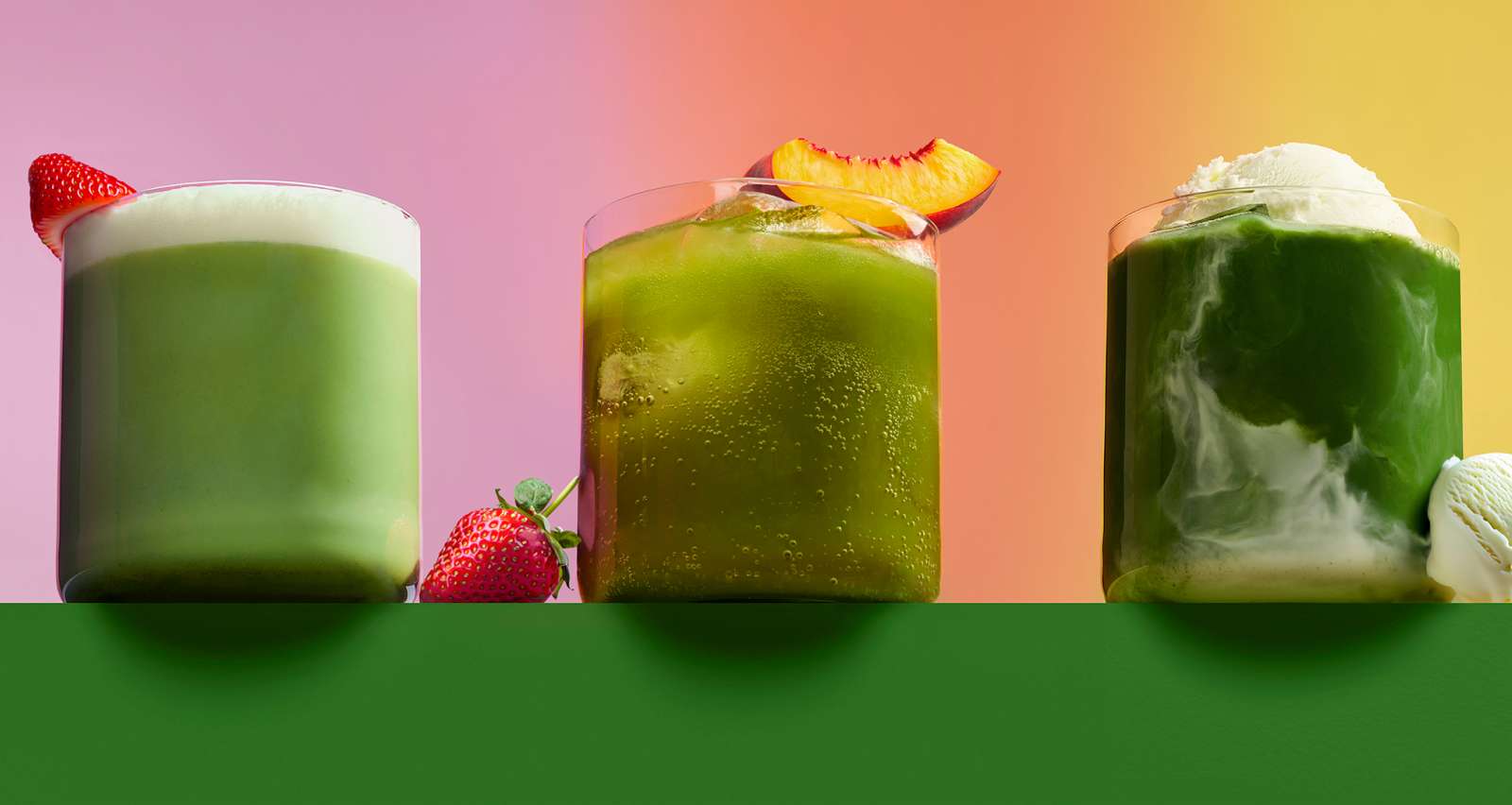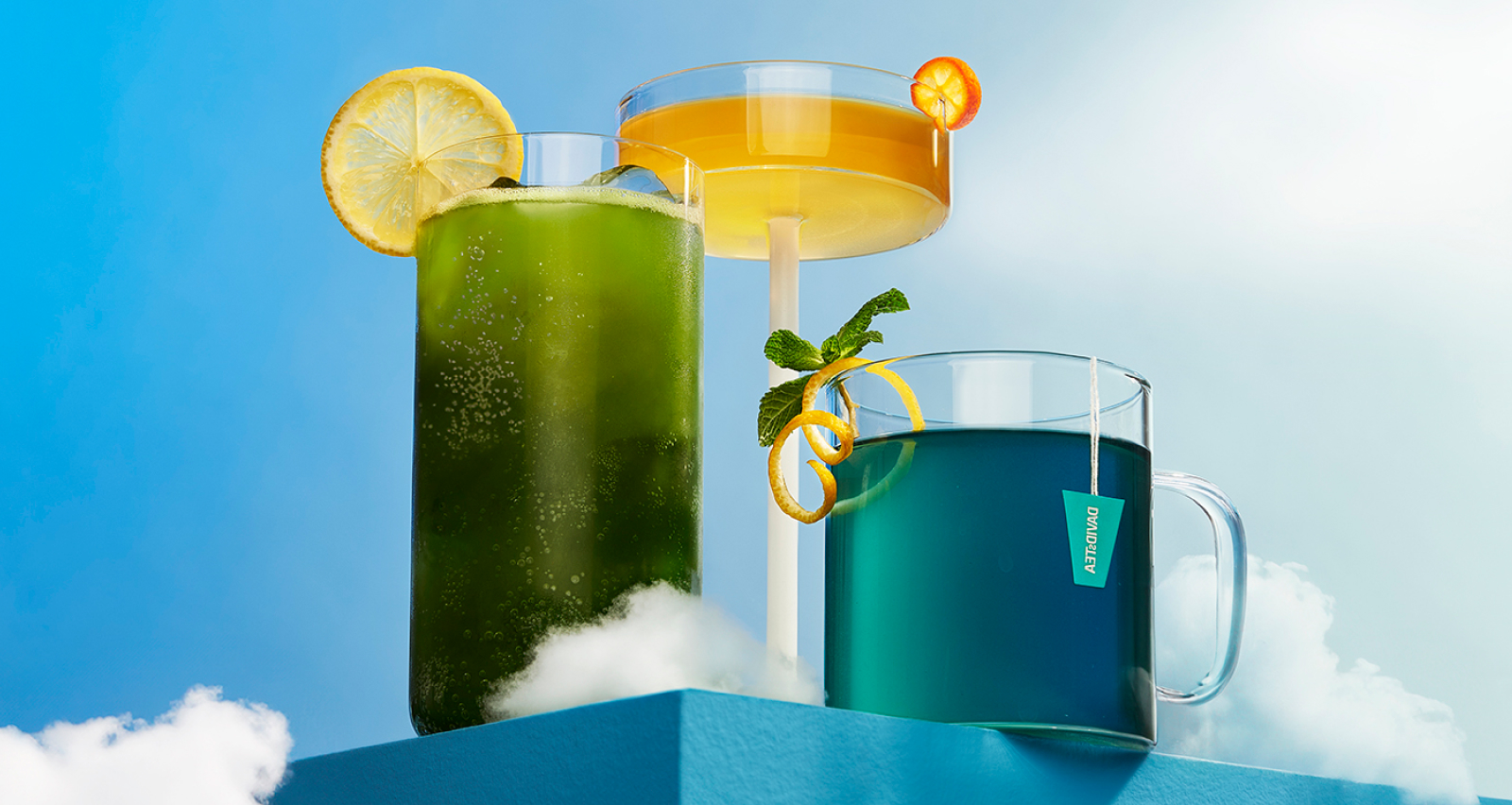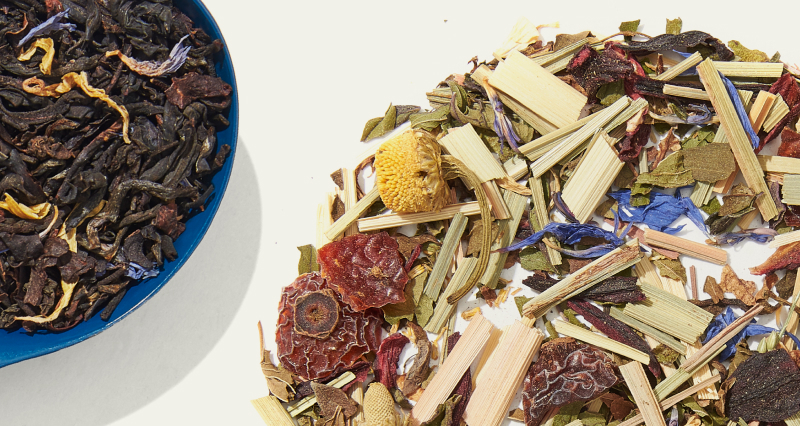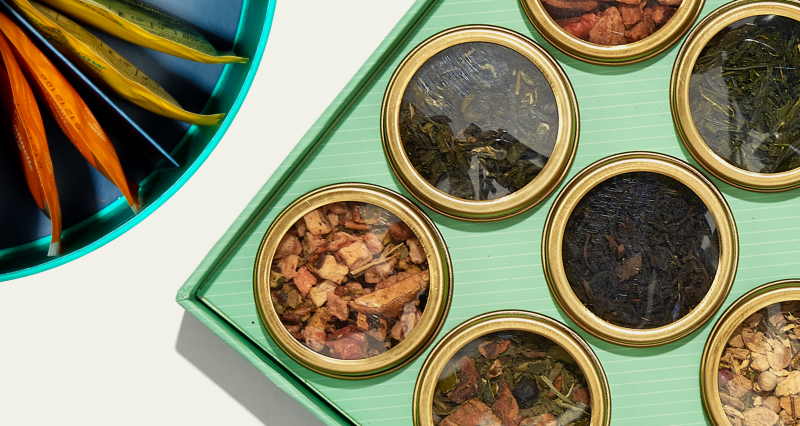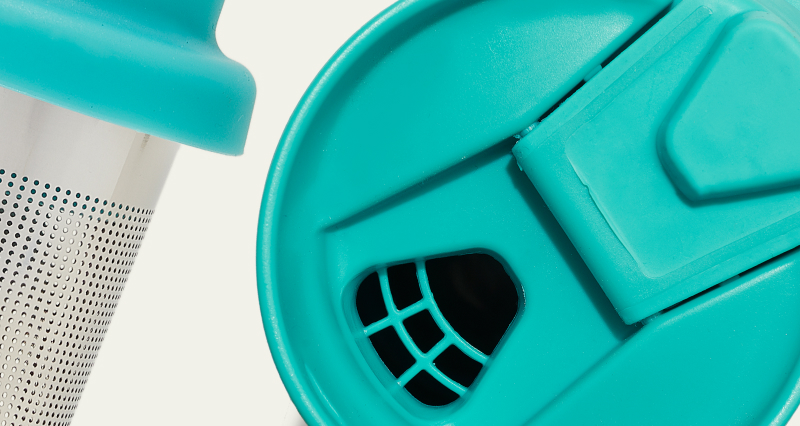Questions about tea
Each tea’s product page contains a list of ingredients and calls out priority allergens—please read through everything carefully. If you have an allergy, we recommend you talk to your healthcare provider before consuming any of our teas.
Although most of our teas do not contain gluten, they’re not produced in dedicated gluten-free facilities and are not certified gluten-free. Please check the ingredient and allergen lists carefully, and if in doubt, speak with your healthcare provider.
And yes, we have a huge assortment of vegan teas! Shop our vegan teas here or look for the “V” logo on each tea’s product page.
Most of our teas contain virtually no sugar, carbohydrates or calories. The majority of our teas have less than 5% the amount of sugar found in most fruit juices or other ready-to-drink beverages on the market, making them a healthier alternative. Some of our teas contain fruit or caramel pieces that can sometimes contribute to the resulting sugar in the cup.
For more detailed information, check the Nutrition Facts Tables (NFTs), that are available for all our teas. Just look under each tea’s “Highlights” and “Ingredients” sections for the link..
For more detailed information, check the Nutrition Facts Tables (NFTs), that are available for all our teas. Just look under each tea’s “Highlights” and “Ingredients” sections for the link..
There are a ton of factors that can change the amount of caffeine in your cup, like water temperature and steeping time. Although it’s virtually impossible to measure the exact amount of caffeine in every cup, we‘ve tested all our teas to come up with a general rating system.
Here are our caffeine categories (you can find the caffeine rating for each tea on its product page):
Here are our caffeine categories (you can find the caffeine rating for each tea on its product page):
| Caffeine-free | contains 0 mg of caffeine per cup | |
| Low caffeine | contains 1-19 mg of caffeine per cup | |
| Medium caffeine | contains 20-39 mg of caffeine per cup. In the world of tea, our medium selection still means that you won't be getting the high caffeine content of a cup of coffee. | |
| High caffeine* | contains 40+ mg of caffeine per cup. |
*Coffee contains about 142 mg of caffeine per cup.
We sure do!
We have a growingcollection of Certified Organic teas, all certified by Ecocert Canada. You can shop them here!
We also have a variety of kosher teas certified by Montreal Kosher (MK), so you’ve got a lot of choice. Check those out here!
For our Fair Trade teas, we partner with Fair Trade USA—their certification supports the sustainable growth and ethical production and trading of ingredients. The Fair Trade CertifiedTM logo stands for fair wages, safe working conditions, eco-friendly practices and a commitment to community development. Browse our full Fair Trade collection here. Wondering why not all of our teas are Fair Trade? It’s very important to us to make sure we offer teas at prices that are accessible to all our customers. Because the cost of Fair Trade CertifiedTM teas is higher—for our vendors, company and customers—we also offer teas that do not carry Fair Trade certification.
We have a growingcollection of Certified Organic teas, all certified by Ecocert Canada. You can shop them here!
We also have a variety of kosher teas certified by Montreal Kosher (MK), so you’ve got a lot of choice. Check those out here!
For our Fair Trade teas, we partner with Fair Trade USA—their certification supports the sustainable growth and ethical production and trading of ingredients. The Fair Trade CertifiedTM logo stands for fair wages, safe working conditions, eco-friendly practices and a commitment to community development. Browse our full Fair Trade collection here. Wondering why not all of our teas are Fair Trade? It’s very important to us to make sure we offer teas at prices that are accessible to all our customers. Because the cost of Fair Trade CertifiedTM teas is higher—for our vendors, company and customers—we also offer teas that do not carry Fair Trade certification.
While we offer so many amazing unflavoured teas, sometimes we fall for a blend that does contain flavouring. In fact, it’s the reason some of our favourite blends taste so great! Keep in mind that no matter how strong the taste may be, the actual amount of flavouring in a brewed cup of tea is next to nothing — about 0.001%.
But if flavouring isn’t your thing, you’ve still got a ton of options. We carry over 40 unflavoured blends… and counting!
But if flavouring isn’t your thing, you’ve still got a ton of options. We carry over 40 unflavoured blends… and counting!
Different kinds of flavouring have more in common than you might think. In a lot of cases, natural and artificial flavourings have the exact same chemical composition—they’re just made in different ways. Artificial flavouring is every bit as safe to drink as natural flavouring.
Natural flavouring comes from all natural sources, such as essential oils, essences or extracts. And when it complies with certain regulatory standards, we get to use the word organic.
When a flavour doesn’t come entirely from natural sources, it’s considered artificial. Some artificial flavourings are almost 100% natural—others are entirely man-made. But if any component of a flavour is created artificially, it has to be labeled as artificial. Why use artificial flavouring? We always use the most delicious, best quality ingredients we can find, and sometimes an all-natural option simply isn’t available.
Natural flavouring comes from all natural sources, such as essential oils, essences or extracts. And when it complies with certain regulatory standards, we get to use the word organic.
When a flavour doesn’t come entirely from natural sources, it’s considered artificial. Some artificial flavourings are almost 100% natural—others are entirely man-made. But if any component of a flavour is created artificially, it has to be labeled as artificial. Why use artificial flavouring? We always use the most delicious, best quality ingredients we can find, and sometimes an all-natural option simply isn’t available.
We grouped all our stevia-free teas together so you can shop them easily!
Even though stevia is known for its benefits and is a favourite natural sweetener, we know that some people have increased sensitivity to the taste. That’s ok! We have teas without stevia, too, and are passionate about experimenting with plants and extracts to find new ways to sweeten.
We choose stevia because it’s a plant-based, natural leaf. Stevia extract is more than 10 times sweeter than sugar—with none of the calories! The stevia plant has been used to sweeten teas and medicines in Brazil and Paraguay for over 1,500 years. Many of our teas and infusions contain stevia extract because its sweetness helps bring out the delicious flavours in our iceable blends—especially the ones packed with juicy fruit.
Even though stevia is known for its benefits and is a favourite natural sweetener, we know that some people have increased sensitivity to the taste. That’s ok! We have teas without stevia, too, and are passionate about experimenting with plants and extracts to find new ways to sweeten.
We choose stevia because it’s a plant-based, natural leaf. Stevia extract is more than 10 times sweeter than sugar—with none of the calories! The stevia plant has been used to sweeten teas and medicines in Brazil and Paraguay for over 1,500 years. Many of our teas and infusions contain stevia extract because its sweetness helps bring out the delicious flavours in our iceable blends—especially the ones packed with juicy fruit.
Did you know that tea doesn’t really expire, it just loses freshness over time?
To keep your teas fresh, always store them in a cool, dry, dark place and keep them well sealed. And to make sure you’re always getting the best cup of tea possible, we recommend you follow these timelines for enjoying your tea:
To keep your teas fresh, always store them in a cool, dry, dark place and keep them well sealed. And to make sure you’re always getting the best cup of tea possible, we recommend you follow these timelines for enjoying your tea:
- Teas and infusions with fruits and nuts: consume within 6 months from date of purchase.
- Straight teas: consume within 12 months from date of purchase.
It’s not uncommon to see dark spots in matcha drink mixes. These spots are crystallized sugar, and not only is your matcha safe to consume, but the taste also isn’t affected. We take the quality of our products seriously and regularly test our teas to ensure they meet Canadian & US food safety requirements.
Your best bet is always to speak to your healthcare provider. All our teas have detailed ingredient lists, so you have the info you need to ask your healthcare provider whether specific blends or ingredients are right for you.
You’ve come to the right place! Depending on the tea type and ingredients, we recommend different steeping times and temperatures to make sure the flavours are just right. You can find our recommended steeping instructions on each tea’s product page.
To learn how to make iced tea, tea lattes, matcha and more, visit our How to: any tea, anywhere page.
To learn how to make iced tea, tea lattes, matcha and more, visit our How to: any tea, anywhere page.
While temperature is easy to determine with a thermometer, how can you tell without one? The easiest trick is the boil-and-wait method. Keep in mind these are just guidelines and not a guarantee.
- 95°C - 90°C: Once your kettle has boiled, let sit for about 1-3 min with the lid open
- 80°C - 85°C: Once your kettle has boiled, let sit for about 7-8 min with the lid open
- 75°C: Once your kettle has boiled, let sit for about 10 min with the lid open
Iced tea (including our Cold Brew teas) should be consumed within 3 days.
You’re in luck! Our Cold Brew teas were specially designed to be safely brewed in cold water. Because they go through an additional bacteria reduction process and are prepackaged in a sterile environment, you can skip the hot water step normally needed to eliminate naturally occurring bacteria.
Since the rest of our teas were not developed for cold brewing, it is not recommended that you steep them in cold water.
Since the rest of our teas were not developed for cold brewing, it is not recommended that you steep them in cold water.
Our Customer Care Team is happy to help!
Proposition 65 is a law in place in the state of California. It requires businesses to include a warning label on any products that may contain a measurable amount of any of the 900 chemicals listed by the state of California, many of which already naturally occur in the environment.
It’s important to note that most of these quantifiable levels are often well below the FDA’s and CFIA’s current tolerable intake levels. Most agricultural products sold in California — like everyday fruits and veggies — bear this warning, since trace levels of lead are often found in the environment. That’s why you’ll see it on popular products like avocados, dried berries and even brussels sprouts commonly have this warning.
Are DAVIDsTEA products safe?
Our assortment of teas is safe for consumption. Just like vegetables, teas are grown outside in fields, so there is a possibility that they can come in contact with pesticides and heavy metals. That said, our teas undergo thorough testing and are safe for consumption as per industry and federal standards. We’re committed to providing nothing but the very best for our customers, which is why we also go above and beyond, offering one of the largest organic tea selections in North America.
At DAVIDsTEA, we care about the health and safety of our customers. We want to make sure you know exactly what goes into your mug. That’s why the products we sell have passed through regulatory safety standards, as well as our own internal high quality standards — so you can trust that when you buy a tea from DAVIDsTEA, it’s safe to consume.
Why do I see it in my DavidsTea order?
Proposition 65 warnings must be displayed on any and all orders shipped to California, regardless of what items are on the order—whether it’s a tea, accessory or tea gift set. This is the same warning that’s found on hotels, stores, gas stations, airports, golf courses, public parks and other public buildings in the state of California.
Why is it that only DAVIDsTEA matchas have the warning on your website?
Our matcha green tea supplier informed us that there are trace amounts of lead in our traditional and flavoured matchas. In an effort to maintain transparency and our commitment to quality, our matcha products will now bear a lead warning. Please note that these amounts are well below the federal limits for food products, meaning they’re safe for consumption.
Why would there be lead in matcha green tea?
Since teas are grown outside in fields, there’s a possibility they come in contact with lead found in soil. How did it get there in the first place? Its presence in agricultural products can be attributed to industrialization, which has increased with the use of burning coal, oil and other fossil fuels. This results in an increase of lead in the environment, which is then absorbed by plants and agricultural products.
For more information about Proposition 65, please visit: P65Warnings.ca.gov/food
It’s important to note that most of these quantifiable levels are often well below the FDA’s and CFIA’s current tolerable intake levels. Most agricultural products sold in California — like everyday fruits and veggies — bear this warning, since trace levels of lead are often found in the environment. That’s why you’ll see it on popular products like avocados, dried berries and even brussels sprouts commonly have this warning.
Are DAVIDsTEA products safe?
Our assortment of teas is safe for consumption. Just like vegetables, teas are grown outside in fields, so there is a possibility that they can come in contact with pesticides and heavy metals. That said, our teas undergo thorough testing and are safe for consumption as per industry and federal standards. We’re committed to providing nothing but the very best for our customers, which is why we also go above and beyond, offering one of the largest organic tea selections in North America.
At DAVIDsTEA, we care about the health and safety of our customers. We want to make sure you know exactly what goes into your mug. That’s why the products we sell have passed through regulatory safety standards, as well as our own internal high quality standards — so you can trust that when you buy a tea from DAVIDsTEA, it’s safe to consume.
Why do I see it in my DavidsTea order?
Proposition 65 warnings must be displayed on any and all orders shipped to California, regardless of what items are on the order—whether it’s a tea, accessory or tea gift set. This is the same warning that’s found on hotels, stores, gas stations, airports, golf courses, public parks and other public buildings in the state of California.
Why is it that only DAVIDsTEA matchas have the warning on your website?
Our matcha green tea supplier informed us that there are trace amounts of lead in our traditional and flavoured matchas. In an effort to maintain transparency and our commitment to quality, our matcha products will now bear a lead warning. Please note that these amounts are well below the federal limits for food products, meaning they’re safe for consumption.
Why would there be lead in matcha green tea?
Since teas are grown outside in fields, there’s a possibility they come in contact with lead found in soil. How did it get there in the first place? Its presence in agricultural products can be attributed to industrialization, which has increased with the use of burning coal, oil and other fossil fuels. This results in an increase of lead in the environment, which is then absorbed by plants and agricultural products.
For more information about Proposition 65, please visit: P65Warnings.ca.gov/food
